“No Hate, No Fear”: Reflections from Airport Protests
BY ISN STAFF | February 2, 2017
“Blessed are the merciful, for they will be shown mercy.” [Matthew 5:7]
Throughout the world on Sunday, January 29, Catholics heard these words, determined by the Catholic lectionary developed in the 1960s after the Second Vatican Council, without knowledge of the realities of 2017.
On Sunday, many members of the Ignatian Family felt compelled to be merciful, to stand with immigrants and refugees in the wake of recent executive orders signed by President Trump.
These are their personal reflections.
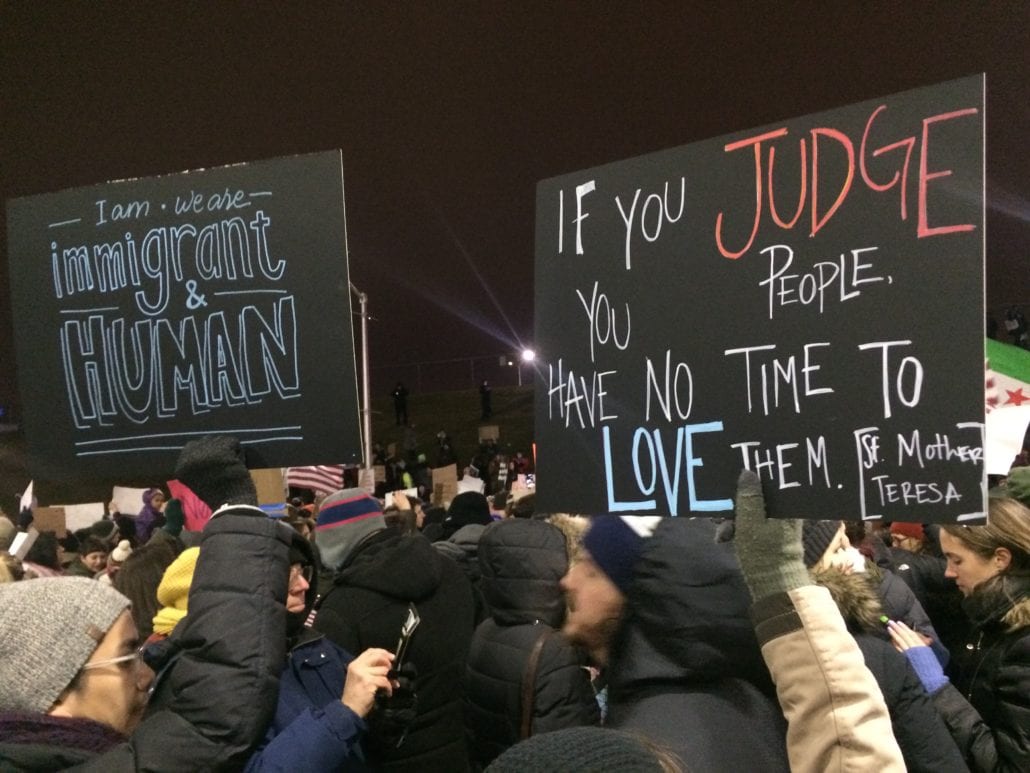
Protesters hold signs at O’Hare International Airport in Chicago
Lifting Up Prayers With Every Chant
“Let them go! Let them go!” rippled through the crowds, each voice lifting the prayer higher and higher. Chicago O’Hare International Airport held families and community members, lawyers and activists, Christians and Muslims, police officers and demonstrators, and yet, our diversity and our numbers only proved to make our petition stronger.
“She is what an American looks like!” exploded from protesters as a detained Muslim woman emerged from the baggage claim area. She was holding her toddler to her shoulder as she rushed towards her family, who the volunteer immigration attorneys had ensured were moved to the front of the pack. That was the loudest point in the rally, and every face I saw was tear-streaked and beaming with joy.
The beauty of the airport protests is found in how spiritual the rally was in every aspect. Speaking directly from my experience at the Chicago rally, I know that it was a peaceful political demonstration of support and solidarity. The chants, such as those I mention above, were prayers spilling out of the mouths of participants.
Let’s continue to participate in these public displays of love, and continue to lift up prayers with every chant, every poster, every donation and every relationship. God is in all things; even in the worst situations, He is present. I saw him in the demonstration, and I know many others did too. I am encouraged and empowered to make this radical love, rooted in God’s way of love, the greatest legacy of today.
[Kathleen Lantto: Loyola University Chicago (‘17)]
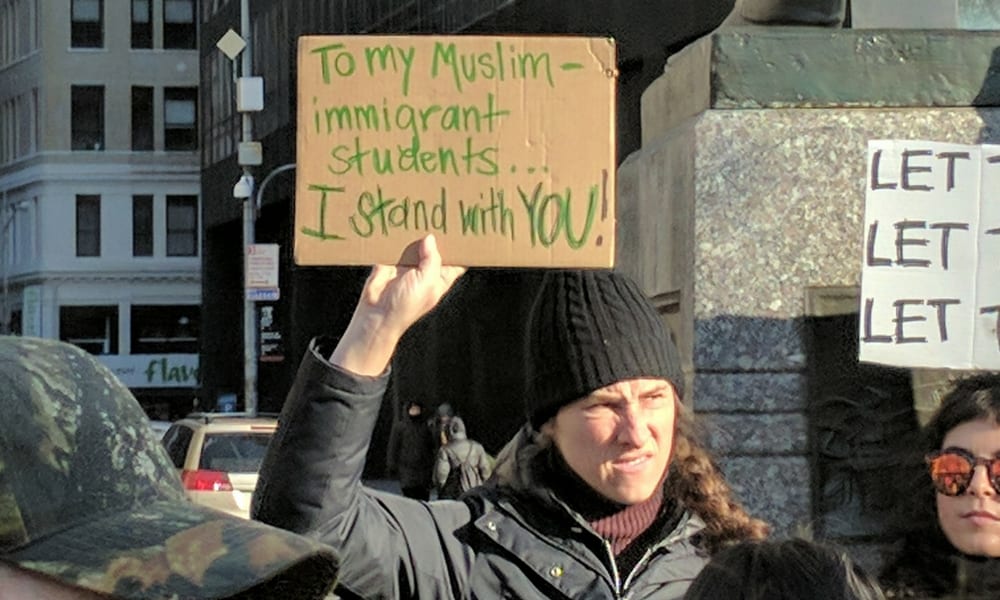
Protester at Battery Park in New York City
“No hate, no fear, refugees are welcome here!”
On Sunday afternoon, I gathered with thousands of others in Battery Park in Lower Manhattan to peacefully protest the recent executive order signed by President Trump, which bans all Syrian refugees from the US, blocks others for at least 120 days, and severely restricts immigration from seven majority Muslim countries.
We gathered with the Statue of Liberty in sight to assert our commitment to the message inscribed upon it: “Give me your tired, your poor, your huddled masses yearning to breathe free…”
I was feeling desolate and powerless regarding the executive orders and I knew that I needed to take action, to make my voice heard, on behalf of my brothers and sisters who are refugees and immigrants. Most importantly, I went to the protest as a Catholic, because I believe that we are called by God to welcome the stranger.
As soon as I arrived, I saw a teacher holding a simple sign: “To my Muslim-immigrant students…I stand with YOU.” As an educator, I took it as a (figurative) sign that I was meant to be there. Besides standing up for what I believe to be right, it is important for me to protest these actions as an educator. I want students who are undocumented or refugees to know that they are loved and supported. I want students whose status is not in jeopardy to see that participating in peaceful protest is important and normal.
I left that afternoon feeling much better than when I arrived. I was heartened to see how many people of different backgrounds, different faiths, and different generations united to lift their voices, to denounce a politic of fear and hate, and to show that our city, our state, and our country, made up of its citizens, is not defined by this order.
Maura Toomb stood in solidarity with those detained at airports, and all refugees, at a march in Battery Park in New York City.
[Maura Toomb: Jesuit USA Northeast Province, Associate Provincial Assistant for Secondary and Pre-Secondary Education]
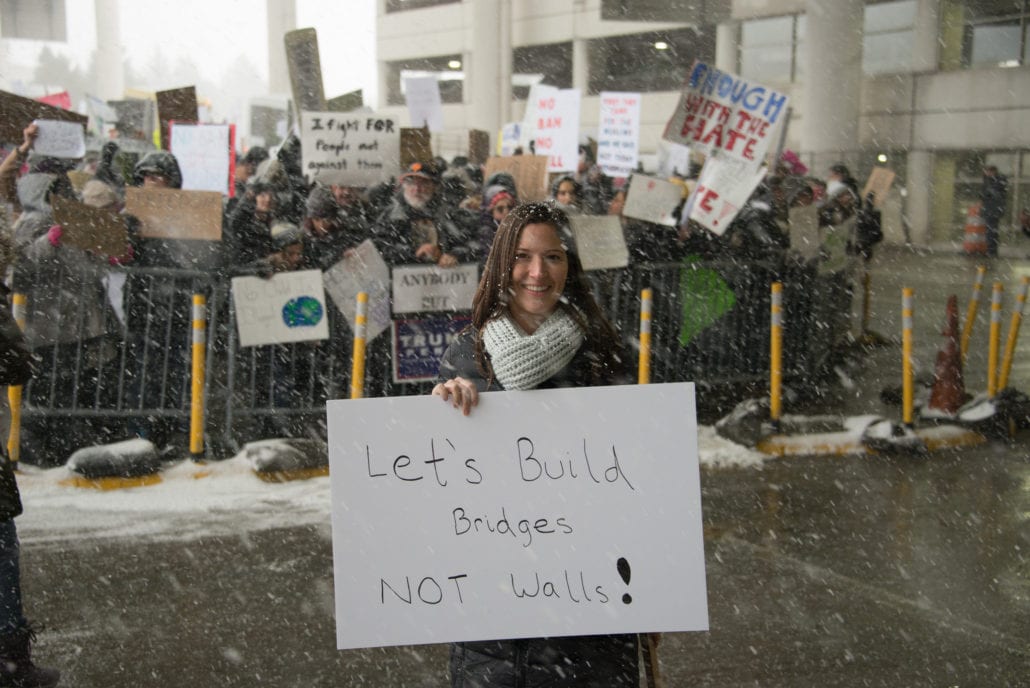
Mary Anthony at Detroit Metro Airport protests
I will not help turn back time.
I became interested in immigration reform about 10 years ago when I traveled to Tijuana with a group from John Carroll University. My most vivid memory of that week is visiting a detention center in San Diego (which is located directly across the border) and sharing a meal with fathers who were separated from their wives and children. These men were desperate to provide for their families and had no other options (save starvation) than to cross illegally into the United States for work. Time was of the essence and the application process was long and full of barriers.
Following graduation, I served with the AmeriCorps program at Covenant House, a homeless shelter for abandoned, trafficked, and exploited youth. Many teens I worked with were brought to the United States as babies from the Dominican Republic, Haiti, or Central America. Though they had assimilated into the US culture, they had no documentation to support their allegiance. Oftentimes, their families had been torn apart by deportation and the problems that result from immense poverty. Others struggled to find work or pursue higher education. All of them felt rejected.
Today, I work and live near Dearborn, Michigan, which has the highest population of Arab-Americans in the United States, many of which practice the Muslim faith. These people are my neighbors and co-workers. We go grocery shopping at the same places and are frightened by similar things. I went to the Detroit Metro Airport protest, not only to show my support for the innocent refugees that are being banned from our country, but to remind those neighbors and co-workers that they are not alone. The Muslim ban defies biblical teaching, our country’s constitution, and is a symbol of the hatred and divisiveness that we are in the best position to fight. I will not help turn back time.
[Mary Anthony: John Carroll University (‘09)]
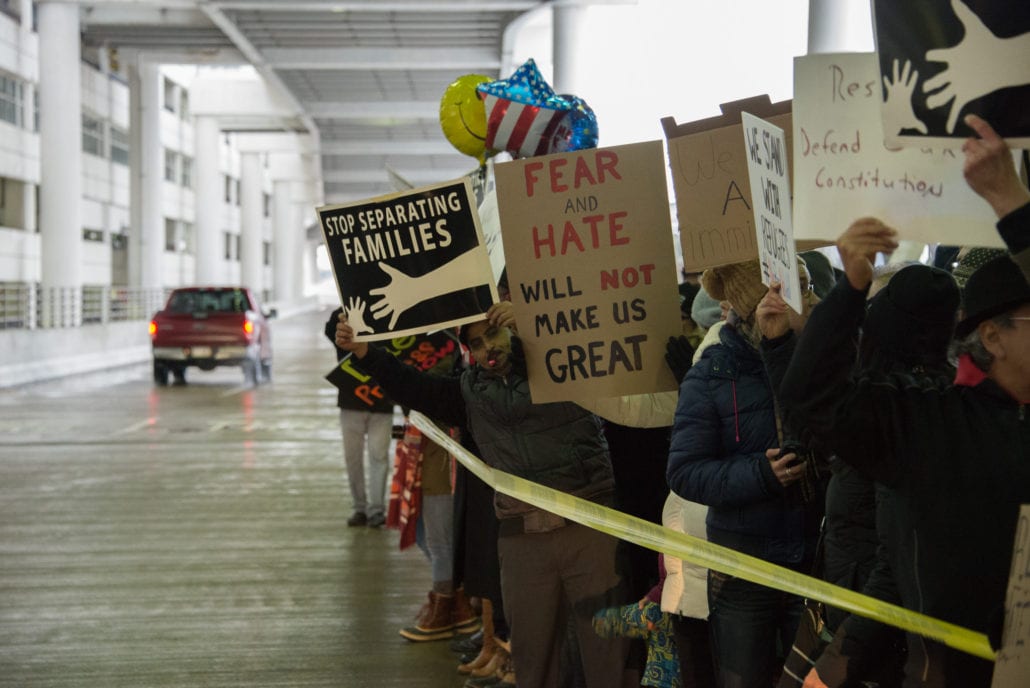
Protesters at Cleveland Hopkins International Airport
Children of the Same God
Since last July, Holy Trinity Parish in Washington, DC has been working with Lutheran Social Services to help resettle a refugee family in Northern Virginia.
After months of work, we received word that our family had been approved for arrival in the United States in early February. That afternoon, the language of President Trump’s executive order immediately banning all Syrian Refugees was leaked to the press. I was saddened by the fact that this family of strangers who we considered our own family would likely be barred from entering the United States after being vetted and approved by our government.
When I heard word of the spontaneous rally at Dulles International Airport on Saturday, I immediately rented a Zipcar, called a friend, and headed to join them. We were expecting to be part of a small group, but saw hundreds of people lined up at the international gate.
As I looked around, I noticed that this was a very different crowd from the one I had been with at the March for Life on the previous day. In fact, many of us who gathered to welcome new neighbors and to demand change from our government may not have agreed on a single other political issue. But in that terminal, we gathered as one people to stand up for the dignity of our brothers and sisters around the world.
At one point, I looked around along the rope line to my left. There I stood, a Catholic activist. To my left was a Lutheran priest. To his left, a Black Lives Matter activist. To her left, a pair of women with pink hats from the women’s march – all of us children of the same God, making a powerful stand for the dignity of all of His children.
[Chris Crawford: parishioner, Holy Trinity Parish, Washington, D.C.]
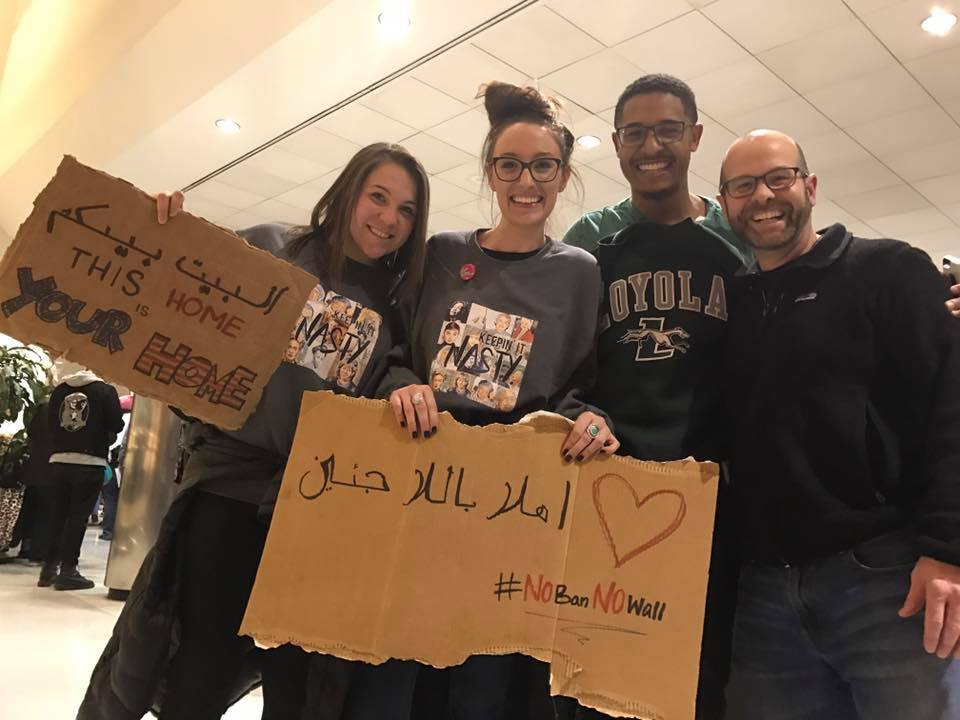
Sean Bray with Loyola University Maryland students at Baltimore-Washington International Airport
“The measure of your compassion lies not in your service of those on the margins, but in your willingness to see yourselves in kinship with them, connected to them – to move beyond the service of the other, to a solidarity, where your heart is in the right place – and, now finally, to a place of kinship, where your feet are in the right place.”
-Greg Boyle, SJ
On Sunday, my wife and I loaded up our three children and drove to BWI airport to stand in solidarity with others who were as outraged as we were by the ban and vilification of refugees and immigrants. As a Catholic, my faith compelled me to action on behalf of the most vulnerable. Throughout my Catholic education and formation I’ve been taught and deeply believe that faith and justice are inextricably linked. My experience and my prayer leads me to believe these men and women, who we label “refugees” and “immigrants”, are not a threat to our society. They do not seek to dismantle the nation we call home or threaten our safety. They are seeking their own safety, hope, and future.
I’ve sat with men who were deported from the United States where they had lives, families, and a history since they were children. I’ve met others who came north hoping to escape the violence of their homelands of Honduras and El Salvador.
In Thailand, I spent time with college-aged Buddhist monks who fled from Burma because their lives were at risk. In the Dominican Republic, I witnessed families living in gut-wrenching poverty that was still, somehow, a step above what they left behind in Haiti. Here in the United States, I know Muslims who are now fearful to go out at night. I work with students who are anxious their parents will be deported.
As a human being, my heart has been moved to compassion through my encounters with each of these men and women. As a Christian, I am called to follow the example and teachings of Jesus. When I have the courage to follow, he often leads me to the margins of our society which is often beyond my comfort and security. He leads me beyond seeing people as “poor”, “immigrant” or “refugee” and towards kinship and love which is the very nature of God.
Standing at BWI was not something prophetic or heroic, it’s an attempt to live out my baptism and it’s how I am sent forth at the end of mass, “…go now in peace to love and serve the Lord.”
[Sean Bray, Loyola University Maryland, Director of Campus Ministry]
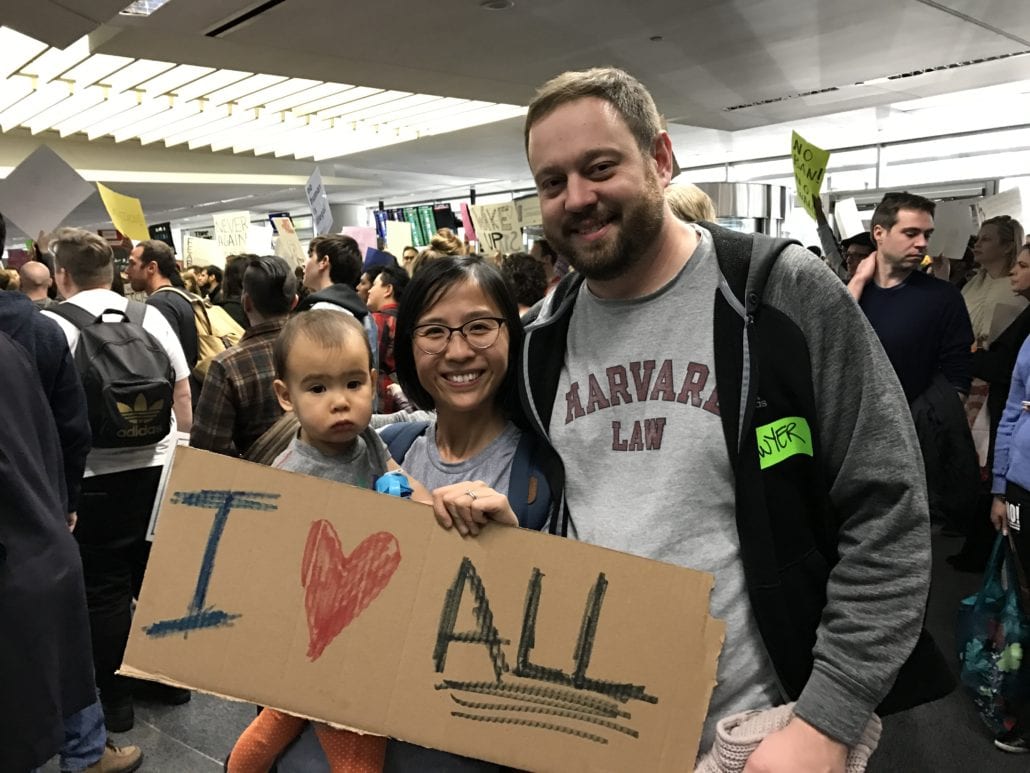
Craig Wickersham with his family at San Francisco International Airport
Images of Solidarity
When I heard of the executive order barring immigrants from a number of countries from entering the United States, I felt a wave of strong emotions–anger, sadness and fear. My wife is an immigrant.
We met in law school while working to provide free legal services for refugees.
During that time, I met people who had suffered immeasurably in their homelands and overcome incredible odds to reach the one place they thought they could be safe and free: the United States. A man named Faras was so grateful to have a place to call home that would accept him and where he could follow his academic passions in safety. Faras was an Iraqi professor who assisted the US army during the Iraq War and was being targeted by militants as a result.
When I heard of the executive orders, I thought of people like Faras being sent the message that they were unwelcome in the US and would be sent back to places they would be in danger. The next day, I had dinner with some Muslim friends and saw the pain and fear they felt from the message the order sent.
My wife and I talked that night about the rallies we saw taking place at the airport in San Francisco and decided to go to turn our feelings into action by sending a message that immigrants and people of other religions should not be made to feel unwelcome in the US. My wife, who is an immigration attorney, volunteered with a legal services organization that was providing free advice to family members who were waiting for loved ones.
When I arrived with my 18 month old daughter, I was surprised at the number of people there, including dozens of people wearing bright green and pink “lawyer” stickers offering to provide advice. The crowd gathered in the lower arrivals level of the international terminal with hundreds of different signs, mostly expressing the basic message that all people should be welcome in the United States regardless of their religion or national origin. The most popular chant of the day was “no ban, no wall, sanctuary for all,” which reflected the message of openness that most of my fellow participants were trying to send.
The most heartening thing I took from the experience was the number of people of all different colors, faiths, professions, and walks of life who showed up to send the message that we should welcome strangers and love one another regardless of where we are from. Christians, Jews, and non-believers formed a circle around Muslims to protect them while they prayed. Immigrants and non-immigrants joined together to send a message that America should not turn our backs on the rest of the world. I plan to hold onto those images of solidarity and love to inspire me to strive for justice in my daily life in the days and months ahead.
[Craig Wickersham: Bellarmine College Preparatory, alumnus]
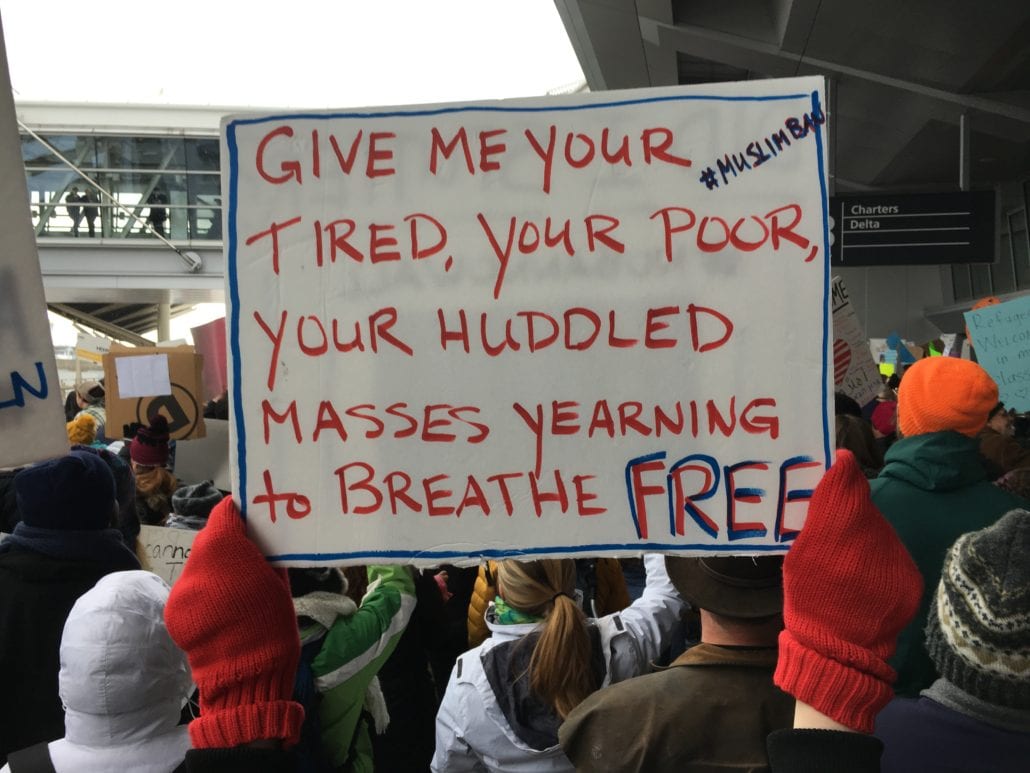
Sign at Cleveland Hopkins International Airport
Rallying, and Considering Future Action
Traffic on the freeway leading to Detroit Metro Airport came to a standstill a mile before the airport exit — all because of the rally-goers. We caught a shuttle with other rally-ers, and the mood on the shuttle was light and excited. People — mostly in their 20’s — from Toledo, University of Michigan, Hamtramck were excited to be participating in something public to stand against the wave of repressive executive orders.
When we finally got to the terminal, we could see perhaps 2,000 people gathered, but there were already hundreds and hundreds who were leaving, who had been there for as long as two hours, since the beginning of the rally.
The organizers of the event were a Michigan contingent of the Women’s March on Washington, and a large Muslim coalition in SE Michigan. The spirit of the rally was exciting with constant chanting and lots of signs.
My primary concern going forward is to find a credible organization or community that can continue to organize in an open, inclusive, intelligent way that seeks an analysis of the country and how we got here.
While the immediate focus may be on the ban against Muslim communities, we have to keep alive the connection to the men and women and children fleeing violence from Central America, and the men and women in US prisons and ghettos and rural poverty.
Meanwhile, our parish, Gesu, is initiating conversations about Sanctuary…I hope that the conversation is parish-wide, and therefore able to include the parishioners concerns for the many sectors of our country who are facing suffering.
[Bill O’Brien: parishioner, Gesu Catholic Church, Detroit, MI; former Jesuit; University of Detroit Jesuit High School (’65), University of Detroit Mercy (’70), Boston College (’71), and Loyola Chicago (’77).]
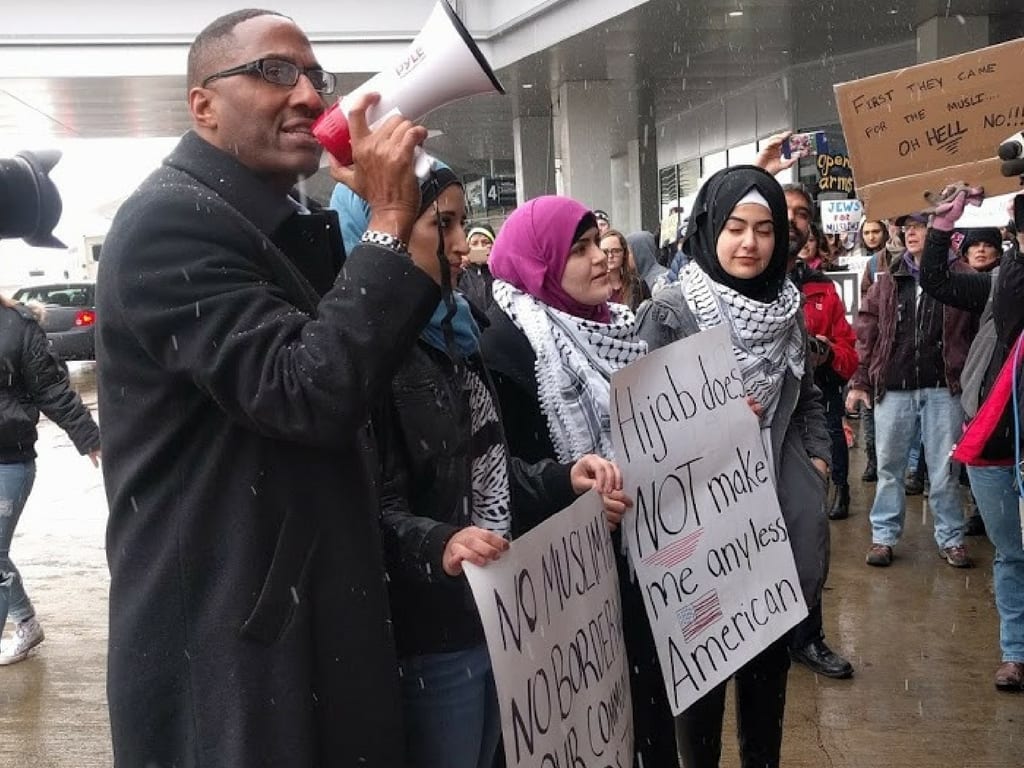
Protesters at Cleveland Hopkins International Airport [Lena Chapin]
At the core of my being I believe the Bible’s words. I believe what every reading in mass on Sunday stated.
“Seek the LORD, all you humble of the earth, who have observed his law; seek justice, seek humility;…”; Zephaniah 2:3
“The LORD keeps faith forever, secures justice for the oppressed, gives food to the hungry. The LORD sets captives free.” Psalm 146:7
“Blessed are the poor in spirit; the kingdom of heaven is theirs!” Matthew 5
“God chose the weak of the world to shame the strong, and God chose the lowly and despised of the world, those who count for nothing, to reduce to nothing those who are something, so that no human being might boast before God.” 1 Corinthians 1:27-29
During his homily on Sunday, my priest said “the Beatitudes are the Church’s mission statement. How can we better live our mission?”
How could I sit at home? How could I turn my back on the stranger? On Jesus?
So I marched. And I will continue marching until the walls, that are being built by fear and hatred, come tumbling down.
[Lena Chapin: Ignatian Solidarity Network, Development Coordinator; John Carroll University (‘10)]

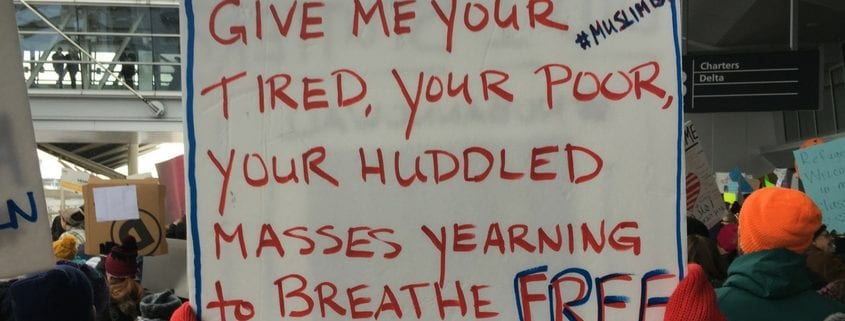

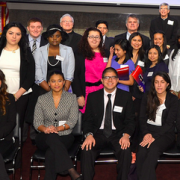
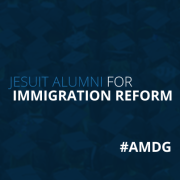


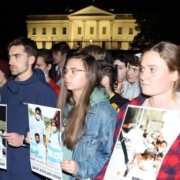

Trackbacks & Pingbacks
[…] “No Hate, No Fear”: Reflections from Airport Protests […]
Leave a Reply
Want to join the discussion?Feel free to contribute!